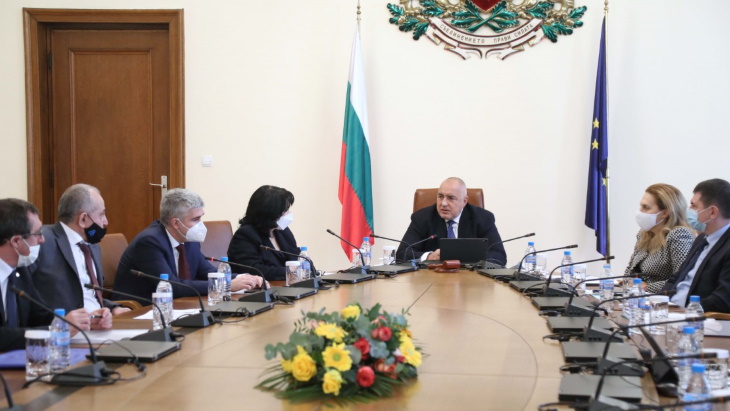Bulgarian cabinet approves plan for new unit at Kozloduy
The Bulgarian Council of Ministers, at a meeting on 20 January, approved plans presented by the Minister of Energy to construct a seventh unit at the Kozloduy nuclear power plant using Russian-supplied equipment purchased for the Belene project. The minister noted discussions have been held with Westinghouse of the USA to construct the unit.

The meeting of the cabinet on 20 January (Image: Council of Ministers)
During the meeting, Energy Minister Temenuzhka Petkova recalled that on 18 October last year the Council of Ministers took a decision giving a mandate to the Kozloduy plant to enter into negotiations with US companies that are developing the latest nuclear energy technology. The aim, she said, was to look for an opportunity to implement Kozloduy unit 7 based on the Nuclear Regulatory Agency's approval of the site and the effective environmental impact assessment (EIA) for the project. A working group of experts from the Kozloduy plant and international experts was formed. Their report - which concluded it is economically, environmentally and technically possible for the Belene equipment to be used for a new unit at Kozloduy - was completed on 19 January.
The energy ministry, Petkova said, has held discussions with Westinghouse on the construction of a unit at Kozloduy that would make maximum use of Russian equipment that Bulgaria has already purchased for the proposed Belene plant. That equipment is worth some BGN1.3 billion (USD810 million).
"In the course of the group's work, talks were held, correspondence was exchanged, including with colleagues from Westinghouse, as there are three approved EIA technologies. One technology is the American one for AP1000 reactors, the other two are Russian technologies, which are the reactors for the Belene nuclear power plant," Petkova said.
"With our report we have given the opportunity to make a reasoned, careful and informed decision about the future of our energy," said Nasko Mihov, executive director of the Kozloduy plant. "This project is not easy either, but with good organisation we can launch a new unit within ten years."
Approving the report, the cabinet called on the Energy Minister to organise the preparation of a financial model and a legal analysis for the new option. In addition, the minister must continue studying the possibilities for constructing a new plant using small modular reactors.
Prime Minister Boyko Borissov described the report as a good strategy, which contains important and quick steps for action on the project.
"These are extremely important infrastructure projects that guarantee national security, energy security and diversification," Borissov said. "In addition, they use the equipment paid for by the state and the taxpayers for the Belene plant. I think that after the seventh, we will go to the eighth reactor."
Bulgaria's two operating Russian-designed VVER-1000 nuclear reactors at Kozloduy - units 5 and 6 - generate about one-third of the country's electricity. The units are licensed to operate until 2027 and 2028, respectively.
The Belene project in northern Bulgaria includes construction of two 1000 MWe units, each using the Russian VVER-1000/V-466 design. Preliminary site works began in 2008, and contracts for components including large forgings and I&C systems were signed with suppliers, but the project was stymied by financing problems and was suspended in 2012. In 2019, the country's government invited strategic investment in the project.
Researched and written by World Nuclear News
- China Institute of Atomic Energy
- Nuclear Power Institute of China
- Southwestern Institute of Physics
- China Nuclear Power Operation Technology Corporation, Ltd.
- China Nuclear Power Engineering Co., Ltd.
- China Institute for Radiation Protection
- Beijing Research Institute of Uranium Geology (BRIUG)
- China Institute of Nuclear Industry Strategy (CINIS)
- China Nuclear Mining Science and Technology Corporation


